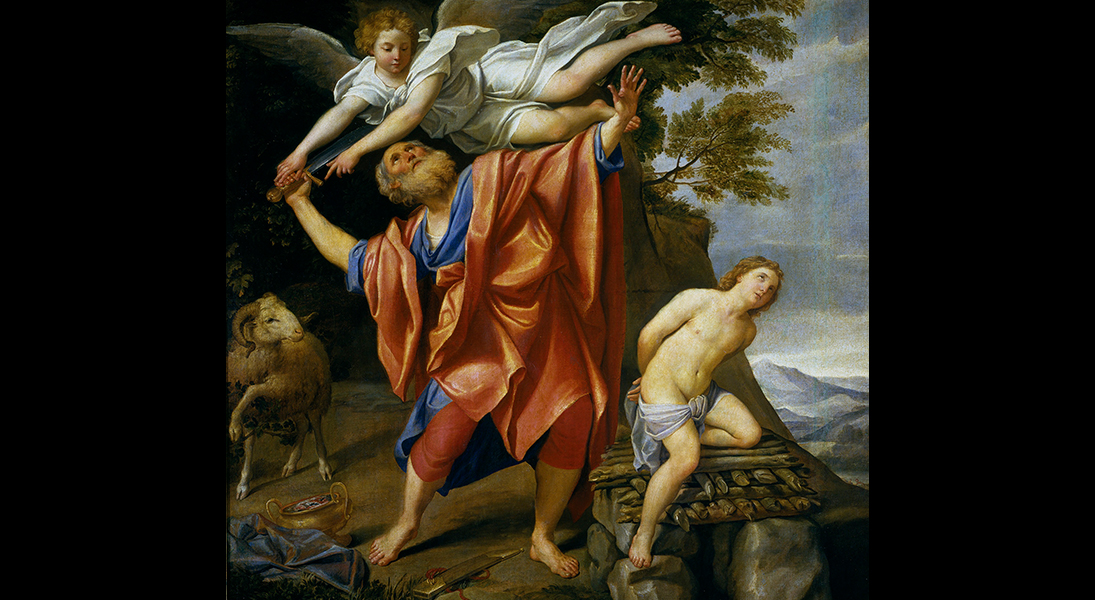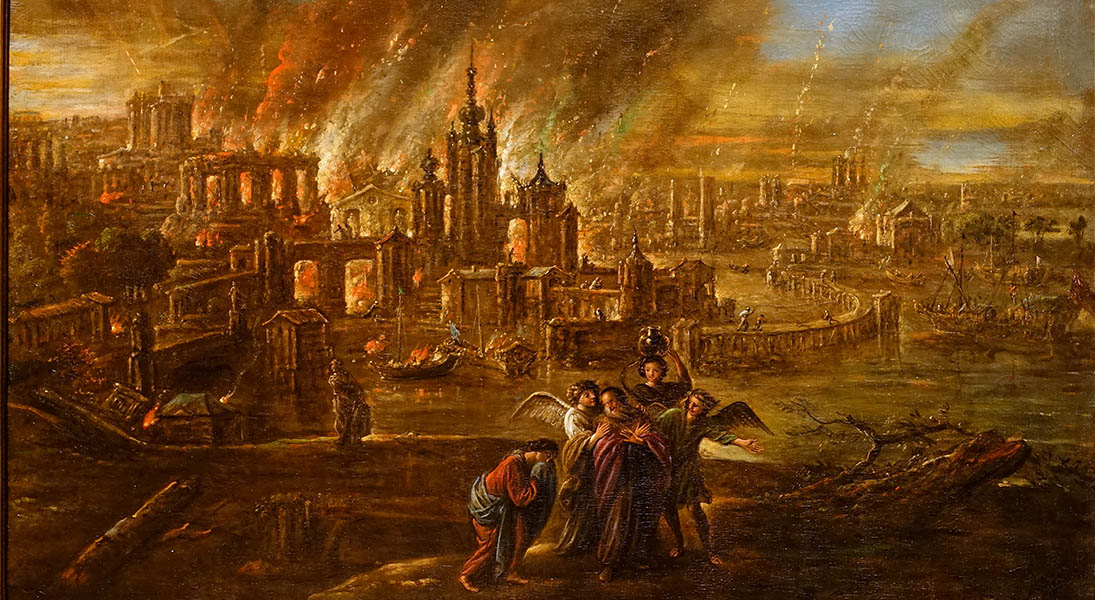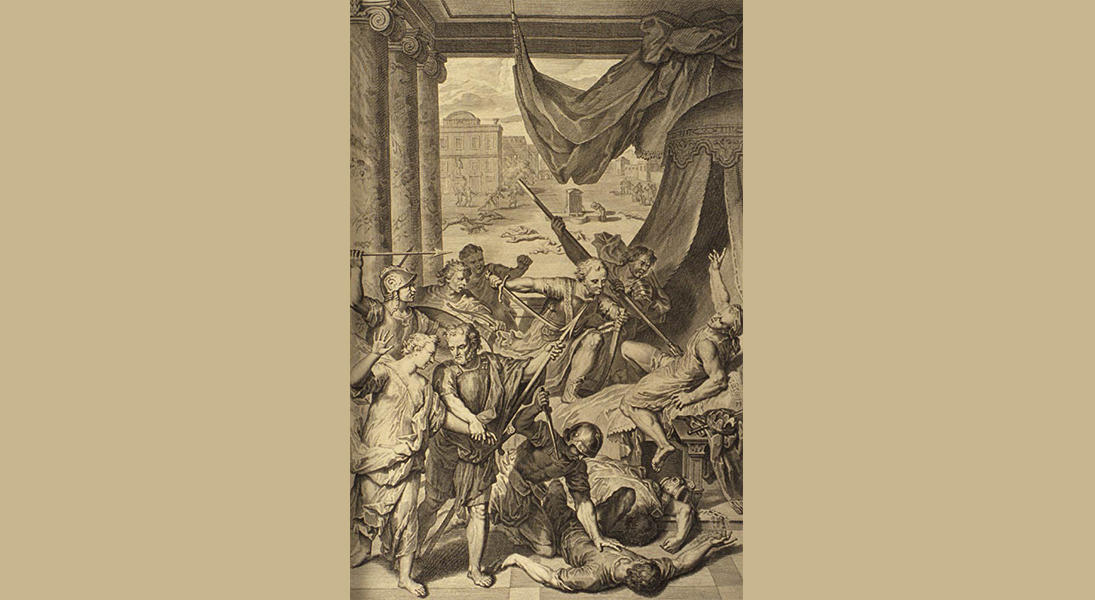One of my earliest memories of church is getting in trouble during Sunday school. We were talking about Noah’s ark. My teacher explained how gracious and kind God was to save Noah and his family. God saved all the animals, and then made the rainbow, he said.
That’s when I started to cry. I tried to tell my teacher and the class—through tears—that God had not saved all the animals. Most of the animals and people died in the flood, I said. That amount of death, at the hands of the God whom I had been told was perfectly loving, overwhelmed my young heart. As I continued to sob, the teacher told me to sit in the corner because, he assumed, I was “purposefully missing the point of the story.”
So many of our foundational scriptural narratives would shock us if we heard them for the first time today. But because some of us have grown up with these Bible stories, we often avoid their difficult issues. This is a pity. If we want to grow stronger in our bodies, we perform challenging tasks such as lifting weights. If we want to grow stronger in our faith, one traditional method is to wrestle with God’s challenging words of Scripture.
Grace within judgment
Genesis 6:1–9:17
I was right to be shocked by Noah’s story as a child. In Genesis 6:6, God perceives that the wickedness of humanity is great, with human hearts only intent on evil. How emotionally gutting this must be for God! The Talmud, the primary source of Jewish law and theology, describes how bad the situation was: humanity’s evil was so pervasive that it corrupted all the animals (BT Sanhedrin 108a).
In Scripture, God grieves in his heart over this (Genesis 6:7). What’s more, God repents of making humans. True repentance is not merely feeling bad or apologizing but working to undo the harm one has done. Thus, God seeks to undo the harm humanity has inflicted on the world by undoing creation itself. God would return creation to the massive ocean that existed before the heavens and earth were created (Genesis 1:1-2).
Yet, even in unmaking the world, God offers grace to Noah and his family. Genesis offers a suspicious description of Noah as being righteous and innocent in his generations. Scholars disagree on this language, but some (Rashi, a medieval rabbi, referencing BT Sanhedrin 108a) note that Noah was righteous and innocent only in his generation—that only in the evilest generation that ever existed could one so imperfect as Noah be described as “righteous.” Therefore, before we hear of his relative righteousness, the text says Noah found grace, or unmerited favor, in God’s eyes.
A portion of humanity and the animals that populated the land and sky were preserved because of God’s graciousness. The humans and animals allowed onto the ark carried corruption with them, to be sure. The flood was in no sense a “clean start,” except maybe for God. After the destruction of the flood ceased, God notes that humanity remains unchanged—the intent of human hearts is still evil (Genesis 8:21). But God will never again undo creation, setting the rainbow in the sky to remind Godself (Genesis 9:15-16) to never repeat such actions.
The flood story is a tale of God repenting twice: undoing creation with destruction, then eschewing that same destruction forever. Yes, God responds in wrath to human violence, but even in judgment, God is gracious.
Grace overcoming cruelty
Genesis 16
Though God is always gracious, even in anger, humans are not. We know that all humans sin and fall short of the glory of God (Romans 3:23). Nevertheless, we are frequently surprised to encounter the messiness and, quite frankly, the ugliness of sin in the matriarchs and patriarchs of the Bible who are so often lionized as examples of faith. The story of Sarai, Hagar and Abram (God has not yet changed their names to Abraham and Sarah) is full of human wrath and lacks compassion.
After failing to conceive, Sarai “takes” her Egyptian servant and “gives” her to Abram to be his wife. Hagar’s offspring would then be reckoned as Sarai’s children. This is incredibly troubling behavior. We must not excuse it as “what was done at the time” simply because the Bible records wives giving their servants to their husbands. In the instance of Abram and Hagar, and also Jacob and Zilpah and Bilhah, the transaction leads to trouble and fractures relationships, to say nothing of the nonconsensual sexual intercourse between master and slave.
Rabbis note that the phrase we translate as “And he went in to Hagar” (Genesis 16:4) reflects that she became pregnant after having intercourse with Abram only once (Genesis Rabbah 45:4). We know God had promised Abram and Sarai land and offspring (Genesis 12:1-2) but that, after a decade on that land, they were unable to have children (Genesis 16:3). When Hagar conceives after her first union with Abram, she looks down on Sarai, who has forced her into reproductive surrogacy.
The realization among all three that Hagar, the foreign servant, suddenly has power in the household infuriates Sarai. Abram meekly acquiesces to whatever Sarai wants to do to Hagar. Dealing with so much abuse from Sarai, Hagar decides to take her chances in the wilderness. There, she encounters God.
While Hagar is in the wilderness, God commands her to return to Abram’s household and, as with Abram, promises her multiple offspring (Genesis 16:10). This moment illustrates that, even when Hagar is driven out of the sight of Sarai and Abram, she is still seen by God. Hagar—the enslaved foreigner, whose body has been used and then discarded—notices how God continues to graciously look after her and calls her Creator “El-roi” (Genesis 16:13), thought to mean “God who sees.”
While her mistreatment at the hands of her enslavers continues for a time, Hagar trusts that God has seen her and will provide for her. Later, God frees Hagar to live with her son, Ishmael, and provides him with a wife from his mother’s homeland (Genesis 21:19-21).
Grace and sacrifice
Genesis 22
Just as Abraham has no mercy for Hagar or Ishmael, he shows a surprising lack of mercy toward Isaac, his son with Sarah. He has raised an army to rescue the citizens of Sodom and Gomorrah after their capture (Genesis 14) and has bargained with God to save Sodom. He has a history of intervening to save strangers and family when they are threatened, even by God. But when God tests Abraham by asking him to offer up Isaac, he doesn’t argue. This is a profoundly challenging passage because it seems to call into question God’s character.
Now, many Christians view Abraham the way philosopher Søren Kierkegaard described him, as a “knight of faith,” for his willingness to sacrifice his son at God’s command. But there is much more to this story than Abraham’s trust in God, especially if we are willing to take the whole counsel of God (Acts 20:27) and read Scripture canonically. Neither Jesus nor Paul praises Abraham for his willingness to sacrifice Isaac. They commend only his faith that God would give him a son.
The New Testament mentions Abraham 70 times but his near-sacrifice only twice. James 2:21 asks if Abraham was justified by his works when he lifted his son upon the altar, and Hebrews 11:17 says he offered Isaac by faith but does not record God commanding it. The Hebrew Bible (commonly known as the “Old Testament”) offers a sustained polemic against child sacrifice. In Jeremiah, God repeatedly denies commanding the sacrifice or burning of children, or even that the idea ever occurred to God (Jeremiah 7:31; 19:5; 32:35).
Clearly God tests Abraham by asking him to sacrifice his son. Is the test to see if Abraham loves God more than he loves his son? Or to see if he knows God as distinct from other gods whose followers practice human sacrifice?
The rabbis pointedly note that God’s command is “bring him up,” not “slaughter him” (Genesis Rabbah 56:8; Rashi on Genesis 22:2). When Abraham binds Isaac and prepares to kill him, God intervenes. God is plainly impressed by Abraham’s willingness to sacrifice Isaac (Genesis 22:12, 16-18). And Abraham responds to God’s voice, both in offering and then in sparing his son’s life (22:18). But Abraham fails the test, at least partially, by imagining that God is just as bloodthirsty as the gods of surrounding peoples and by not arguing for Isaac’s life.
Bad theology has consequences. Abraham is part of a sad tradition of people who traumatize others because they fail to see that God desires mercy, not sacrifice (Hosea 6:6). After Abraham fails to do for Isaac what he has done for strangers and his nephew, God never speaks directly with him again, Abraham and Isaac never speak again, Sarah dies (from shock, I suspect) and God becomes forever “the Fear” of Isaac (Genesis 31:42, 53). Misreading God—and Scripture—can be a multigenerational curse.
Grace instead of rejection
Genesis 19
One of the worst misreadings of Scripture that has given way to multigenerational harm is the fall of Sodom. The men of the town go to Lot’s house and demand that the angels of God be turned over to them to be raped. Many Christians conclude that the Sodomites’ offense is homosexual sex. This misses the point entirely.
Reading the canon of Scripture as a whole and comparing books of the Bible to one another clarifies the account of Genesis 19. In Judges 19-21, the Israelite town Gibeah, and then almost the entire tribe of Benjamin, are condemned for accosting a married couple, then horrifically sexually abusing a woman. The abomination of Sodom referred to abusing visitors, not who was having sex with whom. Ezekiel 16:49 records that the sins of Sodom are pride and lack of hospitality. In Isaiah 1:8-17, the prophet likens Israel to Sodom and Gomorrah specifically because they do not do good, seek justice, rebuke the oppressor, obtain justice for the orphan or plead the widow’s case.
There is nothing about sexuality. Rather, Sodom and Gomorrah are cited as examples of not caring for the neighbor. 2 Peter 2:6-7 mentions how not just the visiting angels but Lot himself was oppressed by the lack of self-control of the people of Sodom. Jesus references Sodom and Gomorrah as examples of inhospitable cities, in the context of preparing his disciples for being rejected by the towns they visited (Matthew 10:15, 11:23-24). Again, there is no sexual connotation to Jesus’ reference to Sodom.
Jude 7 speaks of Sodom’s gross devotion to sexuality in pursuing the flesh of others (heteras here should be understood less as “strange” and more as “other” or “another,” as it is used in Matthew 6:24; 8:21; 10:23; 11:3; etc.). This is exactly the problem with Sodom, according to Scripture—not that its people were homosexual but that they were rapists with unconstrained desire for the flesh of others. The people of Sodom didn’t graciously welcome “the other” but sought to abuse them.
The word of hope here is that God judges Sodom and Gomorrah. God won’t allow abuse of foreigners and visitors to continue unchecked. As Jesus reminds us in his depiction of the final judgment, loving welcome of foreigners is part of what draws praise for sheep. Abuse or rejection of foreigners is part of what brings condemnation for goats (Matthew 25:31-46, especially 35 and 43). Sometimes God’s grace arrives in the form of punishment that prevents further abuse.
Grace and violence
Genesis 34:1-35:5
The last challenging tale is, sadly, another story of people abusing a foreigner who came to dwell among them. In Genesis, Jacob moves his family to Canaan and buys land in the city of Shechem from the sons of Hamor (Genesis 33:18-19). Dinah, Jacob’s only daughter named in the Bible, seeks to visit the women of the country to which she immigrated. Instead, the prince of the land “seized [Dinah] and lay with her by force” (Genesis 34:2).
Having captured the young, foreign girl, the prince attempts to buy her hand in marriage (Genesis 34:11-12). As head of a family isolated in a strange land, Jacob seemingly urges a peaceful resolution. Though profoundly sad, he seems to know that justice will be denied his daughter because his family is outnumbered and the rapist is a leader of the land where they dwell (Genesis 34:30). All too often “might makes right” and foreigners with little recourse to power are denied justice.
Dinah’s brothers swing the pendulum of justice to the other extreme and exact revenge out of proportion to the offense. They kill all the men in Shechem and rescue Dinah from the prince’s house. Jacob seems to have been correct in his fear that his family was too small to seek revenge. Only “a terror from God” protects his family from annihilation by the surrounding cities when they hear of Levi and Simeon’s rampage (Genesis 35:5).
Decades later, the two brothers are remembered as being filled with cursed anger that drove them to commit many murders. In this sad story, God’s grace protects the family as they escape the rage of their neighbors.
Reading with faith and hope
Scripture is full of challenging stories. We do no good by pretending they aren’t there. Instead, let us wrestle with the Bible, letting Scripture interpret Scripture. We must read the whole Bible, letting each section become a lens through which to interpret and explain others.
As the Spirit works on us through holy words, we may have strong reactions (even crying, as I did in Sunday school). We should continue to ponder the confusing texts. With many mysterious and difficult passages of Scripture, the most faithful response is simply to continue the struggle, not giving up or letting go of the text until it blesses us, however it may (Genesis 32:26).












